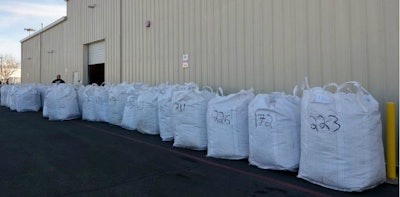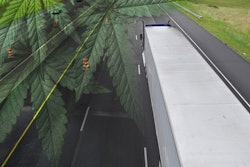 Truck drivers should be wary of transporting hemp across state lines while the USDA continues work on regulations that will prohibit states from impeding the interstate transport of industrial hemp. Earlier this year, a trucker was arrested in Oregon on felony marijuana charges for hauling 6,700 pounds of hemp. The charges were later reduced to a misdemeanor. (Idaho State Police photo)
Truck drivers should be wary of transporting hemp across state lines while the USDA continues work on regulations that will prohibit states from impeding the interstate transport of industrial hemp. Earlier this year, a trucker was arrested in Oregon on felony marijuana charges for hauling 6,700 pounds of hemp. The charges were later reduced to a misdemeanor. (Idaho State Police photo)The federal government in 2018 took steps to fully legalize manufacturing and distribution of industrial hemp — a cannabis plant similar to marijuana, but with only trace amounts of the psychoactive compound THC (tetrahydrocannabinol).
However, technicalities within the bureaucratic rulemaking process have caused confusion, and drivers and carriers could still be hit with criminal charges for transporting hemp until the Department of Agriculture finalizes rules to make hemp hauling legal.
“It’s pretty risky right now,” says attorney Brandon Wiseman of the transportation law firm Scopelitis, Garvin, Light, Hanson and Feary. “You’re looking at potential criminal action against drivers. Determine if the state laws allow or don’t allow hemp. Plan routes accordingly and stay out of states that prohibit it.”
At least three drivers in the past 18 months have been arrested and charged with felony counts of marijuana trafficking and distribution in Idaho. The drivers were hauling legal hemp — grown in Colorado and bound for Oregon, and vice versa. Idaho authorities, however, didn’t make the distinction.
Hemp, as defined by the law, comes from the cannabis plant but only contains 0.3% or less of THC Hemp, once a banned commodity, is now legal to farm and produce — and legal to distribute and haul interstate. The Agricultural Improvement Act of 2018, colloquially known as the 2018 farm bill, removed hemp from the Drug Enforcement Agency’s schedule of controlled substances, making hemp legal at the federal level.
The law also includes a provision that bans states from impeding the transportation or shipment of hemp or hemp products. The issue truckers have run into, however, is that in order for that provision to take effect, the U.S. Department of Agriculture must publish regulations and guidelines governing hemp production. USDA currently has a rulemaking with the White House’s Office of Management and Budget, but it has yet to be published in the Federal Register and take effect.
Because of that bureaucratic hang-up, some states have yet to comply with the 2018 farm bill’s requirements, putting drivers doing no wrong sideways with state authorities.
“The big issue that’s come up is that when the farm bill was passed, it contained a section that said states will be prohibited from interfering with the interstate transportation of hemp,” said Wiseman, “The problem was a lot of carriers – and I don’t blame them based on the language of the bill – believed it took effect immediately. But if you read closely, it says that when the USDA takes steps to regulate the production of hemp, then the prohibition on states interfering with transportation takes effect.”
In cases described above, truckers Andrew D’Addario of Colorado and Erick Eisenhart of Oregon were transporting 915 hemp plants from Colorado to Oregon. The second case involved trucker Denis Palamarchuk of Oregon, who was hauling 6,701 pounds of hemp from Oregon to Colorado. According to court documents, all three drivers believed it was legal to transport hemp through Idaho because it was legal in the origin and destination states.
After months of court battles, the charges were reduced from felonies to misdemeanors. The reduced charges got the drivers out of jail time, but they are still required to serve unsupervised probation, as well as pay fines and restitution.
With courts siding with the states, Wiseman said his firm is advising clients interested in hauling hemp across state lines to check the laws in each state the load will be traveling through.
And if you do decide to haul hemp – and are doing it legally – get a copy of the grower’s license “so you can be sure you’re transporting hemp that was grown lawfully,” Wiseman added.
Given that the interstate transportation of hemp provision has yet to take effect, it is still a state-level issue, says Wiseman. If hemp is classified as marijuana in a state, it is illegal to haul in that state. Idaho is one of the states that still considers hemp a controlled substance. Ada County, Idaho, Prosecutor Jan Bennetts said in a statement she hopes USDA puts a regulatory system in place soon to help clear the air on the issue.
“The state and defense teams have been working diligently to reach appropriate resolutions in these cases and have entered into the stipulated agreements filed in court,” Bennetts said. “The 2018 farm bill’s intent of allowing the interstate transportation of hemp will only be realized in Idaho once there is a regulatory system in place, which has not yet occurred in Idaho. It is our hope that such a regulatory system will be in place soon so those who would transport or ship through Idaho are not at risk of violating Idaho’s law.”
Following these drivers’ cases going to court, USDA in May issued a legal opinion about the interstate transportation of hemp. The department stated that, even though the provisions from the 2018 farm bill had yet to take effect, the 2014 farm bill also contained a provision that prohibited states from interfering with hemp transportation, as long as that hemp was legally produced under the 2014 farm bill.
In the case with Palamarchuk, who was hauling product for Big Sky Scientific, USDA’s opinion sided with the driver, says Wiseman, but the courts sided with Idaho.
“USDA thought it was lawful in that case – not because of the interstate provision in the 2018 farm bill, but because of a provision about a pilot program from the 2014 farm bill,” Wiseman said. “The courts disagreed.”
USDA says its goal is to have regulations regarding hemp production in place during the fall of 2019 to accommodate the 2020 planting season.











